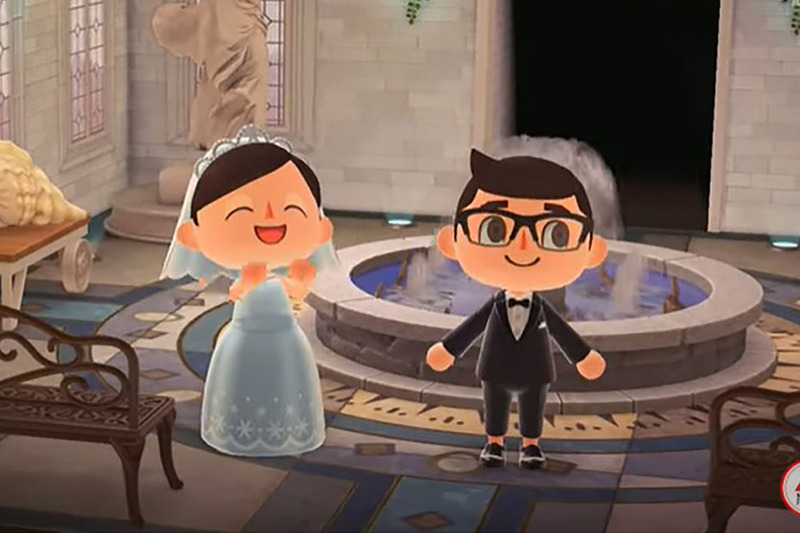AMERICAN WEDDINGS BLOG
Stay up to date with the latest wedding ceremony trends, script writing inspiration, tips and advice for first-time officiants, and news that matters to couples and wedding ministers.
Stay up to date with the latest wedding ceremony trends, script writing inspiration, tips and advice for first-time officiants, and news that matters to couples and wedding ministers.
Published Tuesday, Jan. 9th, 2024
Last updated Friday, Jan. 26th, 2024

That’s a title we never thought we’d write, but here we are… The Future.
Over the last couple of years, artificial intelligence has become a mainstream tool. It shows up everywhere, from medical research, to writing computer code and essays, to generating visual art and music. And no matter what you might think about the ethics behind the AI boom, it’s probably here to stay…
So it should be no surprise that AI has also taken the wedding industry by storm: AI-powered platforms are used by wedding officiants and family members to write wedding speeches, toasts, and ceremony scripts. Soon-to-be-weds can try on rings and wedding clothes using AI shopping features. Couples can ask long-distance friends and relatives to participate in their ceremonies virtually using AI-assisted holograms or augmented reality.
In fact, now couples can even include realistic virtual versions of dead relatives in their ceremonies and wedding planning, with the use of conversational AI avatars. Wild, right?
This rapidly advancing technology brings us to a very unexpected question:
The short answer is, no…
![]()
Image: Photobank / Adobe Stock
Technology is beginning to show up in weddings in unexpected ways... but you still need a human to officiate your wedding ceremony.
Here’s a longer explanation for those who are curious:
As we’ve written before, each state has its own guidelines for who can officiate a wedding. In all states, a wedding officiant must be (at the very minimum) a living human being.
This obviously rules out having an AI avatar of a dead relative or celebrity officiate your wedding. (No AI-generated Elvises or an AI-Obi Wan, sorry.) Coincidentally, it’s also why pets can’t officiate your wedding, even if you consider them family. Avatars of dead relatives, celebrities, or fictional characters can’t get ordained, and they certainly can’t register locally as an officiant in the states where it’s required.
But what about AI avatars modeled on living people? Can a virtual version of a living ordained minister officiate a wedding?
The answer is still no: In states where virtual wedding ceremonies are allowed, couples and their officiant must use approved video-conferencing technology that allows them to see and hear each other in real-time, without anything that distorts their appearance, including filters and any AI-generated features or avatars.
Related: Can you legally marry someone in a video game?
An exception for self-solemnizing ceremonies…
There is an exception to this rule, sort of: Self-solemnizing ceremonies.
You might have heard about a couple in Colorado who used a ChatGPT bot to officiate their wedding last summer… this was possible (and legal) because the couple’s ceremony was ‘self-solemnizing.’ This means that in reality, the couple officiated their own wedding, with an AI chatbot there as a virtual co-officiant or sidekick.
What is ‘self-solemnizing’? In some states, including Colorado, it’s not mandatory to have an officiant perform a wedding ceremony. This means that couples can choose to marry themselves, or ‘self-solemnize’ their marriage, without the help of a minister or officiant.
Because couples marry themselves during a self-solemnizing ceremony, anyone (or anything) who helps ‘lead’ the ceremony is there only in a ceremonial capacity and won’t need to meet the requirements to officiate. This includes AI chatbots, avatars, furry pet friends, and anything else you can dream up.
Currently, only eight states and the District of Columbia allow marriages to be self-solemnized. Read more about self-solemnizing marriage ceremonies here:
AI avatars can certainly co-officiate a wedding…
Although an AI-generated avatar can’t officiate your wedding, it can certainly co-officiate one.
In this case, an authorized human officiant must handle all the legal aspects of your ceremony, including leading the declaration of intent, pronouncing you married, and signing your marriage license.
This leaves your AI co-officiant free to participate in all other aspects of the ceremony, including leading a ring exchange, telling a story, or reading a special poem.
AI Avatars and chatbots can also be used to officiate a vow renewal or commitment ceremony. These rituals are only ceremonial and don’t contain a legal component.

Photo: Screenshot of wedding prep in Animal Crossing: New Horizons, via Switchforce
As online weddings become a regular part of the industry landscape and metaverse conversation trends, some couples wonder if they can legally get married in a video game. Read the full article here.
Become a Wedding Officiant with Our Free Online Ordination!